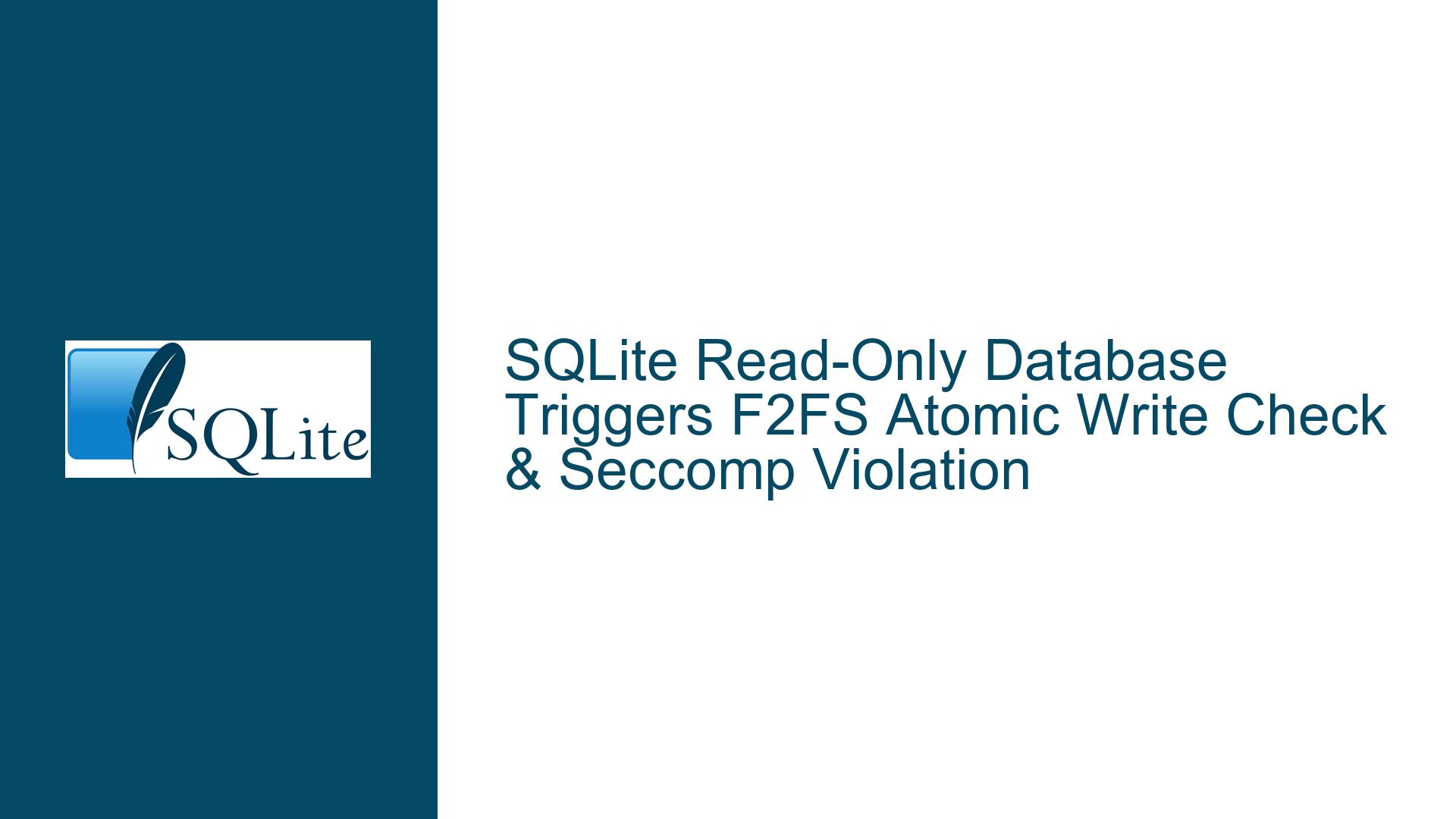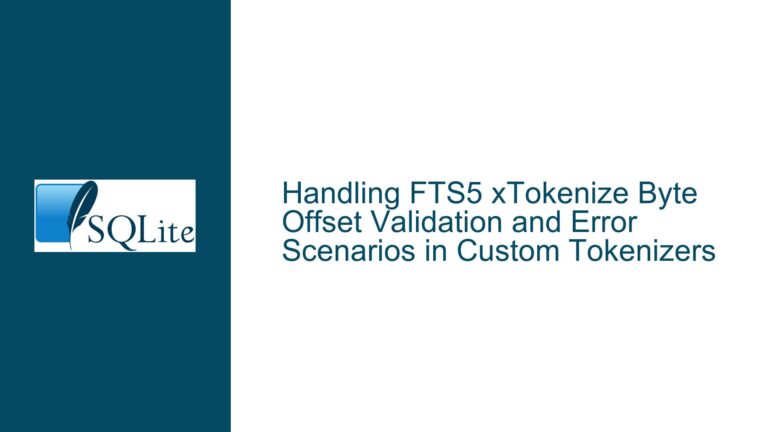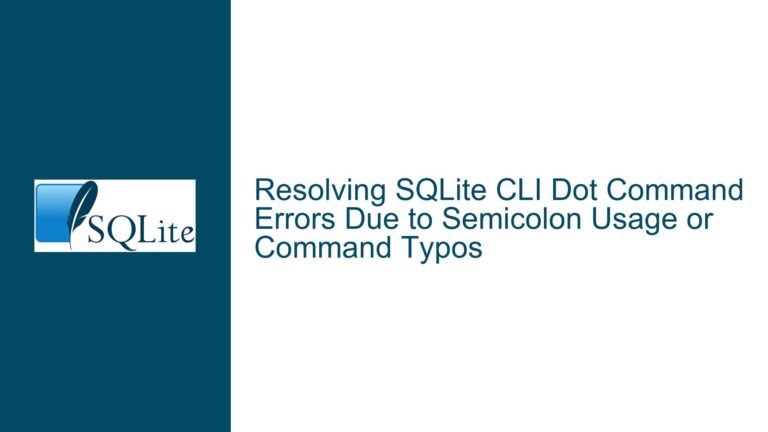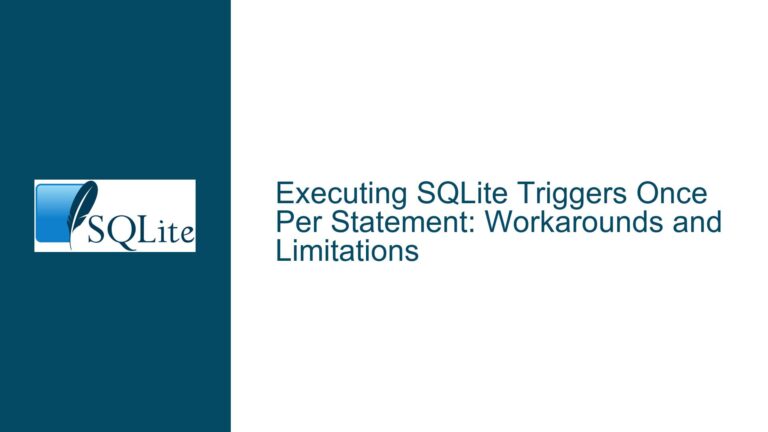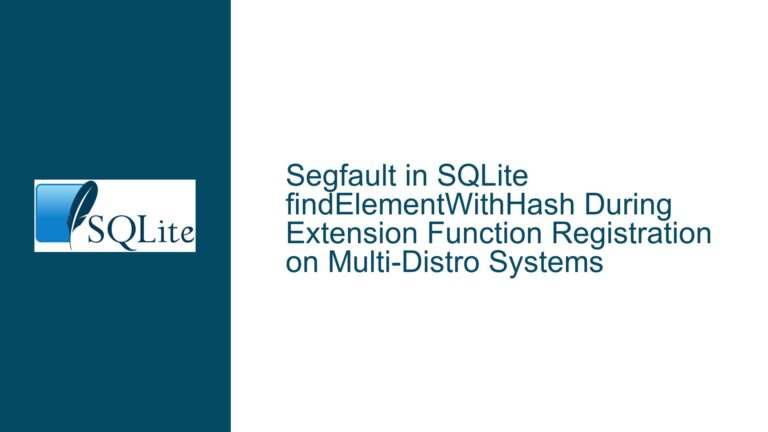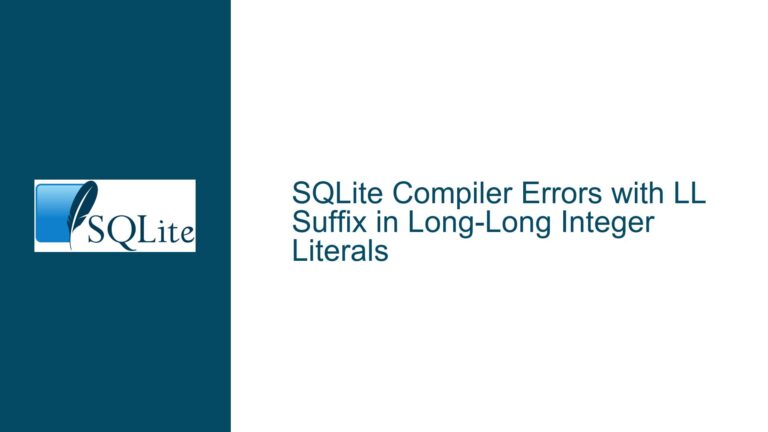SQLite Read-Only Database Triggers F2FS Atomic Write Check & Seccomp Violation
Atomic Write Feature Checks in Read-Only Mode and Seccomp Policy Conflicts
Issue Overview: Atomic Write Detection in Read-Only Contexts
When SQLite is compiled with the SQLITE_ENABLE_BATCH_ATOMIC_WRITE flag, it enables optimizations for atomic batch writes on filesystems that support them, such as F2FS (Flash-Friendly File System). During database initialization, SQLite performs a filesystem feature check via the F2FS_IOC_GET_FEATURES ioctl call to verify whether F2FS_FEATURE_ATOMIC_WRITE is supported. This check occurs regardless of whether the database is opened in read-write (SQLITE_OPEN_READWRITE) or read-only (SQLITE_OPEN_READONLY) mode.
The problem arises in environments with strict security policies, such as those enforced by seccomp (secure computing mode) filters. These filters block system calls that are deemed unnecessary for an application’s operation. In the case of tracker-miners (a GNOME file indexing service), the seccomp policy prohibits the ioctl system call for the F2FS_IOC_GET_FEATURES operation. When a read-only database is opened, SQLite still attempts this ioctl check, triggering a seccomp violation and crashing the process.
The conflict stems from two assumptions:
- SQLITE_ENABLE_BATCH_ATOMIC_WRITE implies that atomic write optimizations are required for all database operations, even if the database is read-only.
- Seccomp policies in applications like tracker-miners assume that read-only database operations do not require filesystem-modifying or advanced feature-checking syscalls.
This mismatch creates a critical failure point where security policies misinterpret SQLite’s intent, leading to preventable crashes.
Possible Causes: Why the F2FS Atomic Write Check Occurs in Read-Only Mode
Incorrect Scope of Atomic Write Optimization Initialization
SQLite’s atomic write feature is designed to optimize transactional commits by leveraging filesystem capabilities. However, the initialization logic for this feature does not differentiate between read-only and read-write database connections. The check forF2FS_FEATURE_ATOMIC_WRITEis unconditionally executed during database handle creation, even when writes are impossible.Overbroad Seccomp Filtering in Host Applications
Applications like tracker-miners enforce seccomp policies that blockioctlcalls to prevent potential privilege escalation or unintended side effects. However, these policies often lack granularity, treating allioctlcommands as equally risky. TheF2FS_IOC_GET_FEATUREScommand is read-only and non-destructive, but it is still blocked because the policy does not whitelist specific safeioctloperations.Compile-Time Flag Assumptions
TheSQLITE_ENABLE_BATCH_ATOMIC_WRITEflag enables atomic write optimizations globally, without considering runtime modes (read-only vs. read-write). This compile-time decision forces SQLite to perform filesystem checks that may not align with the actual usage context.Filesystem Detection Logic in SQLite
SQLite’s filesystem detection logic inos_unix.cdoes not short-circuit for read-only handles. For example, theunixDeviceCharacteristicsfunction callsosIoctlto probe F2FS features, even when the database is opened read-only. This violates the principle of least privilege, as read-only connections should not perform filesystem checks related to write capabilities.
Resolving the Conflict: Adjusting Atomic Write Checks and Seccomp Policies
Step 1: Modify SQLite to Skip Atomic Write Checks in Read-Only Mode
The most direct fix involves updating SQLite’s initialization logic to skip F2FS atomic write checks when the database is opened in read-only mode. This requires modifying the unixDeviceCharacteristics function in os_unix.c:
// In os_unix.c, within unixDeviceCharacteristics():
if( (p->openFlags & SQLITE_OPEN_READONLY) == 0 ){ // Only check if not read-only
int f = 0;
if( osIoctl(pFd->h, F2FS_IOC_GET_FEATURES, &f) == 0 ){
if( (f & F2FS_FEATURE_ATOMIC_WRITE) ){
dvFlags |= SQLITE_IOCAP_BATCH_ATOMIC;
}
}
}
This change ensures the ioctl check only occurs for read-write connections.
Step 2: Refine Seccomp Policies to Allow F2FS_IOC_GET_FEATURES
If modifying SQLite is not feasible (e.g., in downstream distributions), applications like tracker-miners can adjust their seccomp filters to permit the specific ioctl command. For Linux systems, this involves adding a rule for F2FS_IOC_GET_FEATURES (0x8008f602) in the seccomp policy:
// Example seccomp rule using libseccomp
scmp_filter_ctx ctx = seccomp_init(SCMP_ACT_KILL);
seccomp_rule_add(ctx, SCMP_ACT_ALLOW, SCMP_SYS(ioctl), 1,
SCMP_A2(SCMP_CMP_EQ, F2FS_IOC_GET_FEATURES));
Step 3: Conditional Compilation of SQLITE_ENABLE_BATCH_ATOMIC_WRITE
If atomic writes are unnecessary for read-heavy applications, disable SQLITE_ENABLE_BATCH_ATOMIC_WRITE at compile time. This avoids the feature check altogether:
./configure --disable-batch-atomic-write
Step 4: Validate Filesystem Compatibility at Runtime
Applications can pre-check whether the database resides on an F2FS filesystem before opening it. If not, atomic write optimizations are irrelevant, and the ioctl check can be skipped. Use statfs or fstatfs to detect the filesystem type:
struct statfs sfs;
if( statfs(db_path, &sfs) == 0 && sfs.f_type == F2FS_SUPER_MAGIC ){
// Proceed with atomic write checks
} else {
// Skip checks
}
Step 5: Backport Fixes to SQLite Versions
For environments using older SQLite versions, backport the read-only check to the unixDeviceCharacteristics function. This ensures compatibility without requiring a full upgrade.
Step 6: Document Atomic Write Behavior in Read-Only Contexts
Update SQLite documentation to clarify that atomic write checks are skipped for read-only connections. This prevents future regressions and educates developers on the interaction between compile-time flags and runtime modes.
Final Considerations
- Performance Impact: Skipping atomic write checks in read-only mode has no performance penalty, as atomic writes are irrelevant for reads.
- Security Trade-offs: Whitelisting
F2FS_IOC_GET_FEATURESin seccomp reduces policy strictness but is low-risk, as the ioctl is non-destructive. - Portability: The fix requires conditional compilation for non-Unix systems (e.g., Windows), where
ioctlis not used for atomic write detection.
By addressing the root cause (unnecessary checks in read-only mode) and aligning security policies with SQLite’s behavior, this issue can be resolved without compromising functionality or security.
